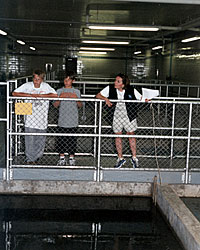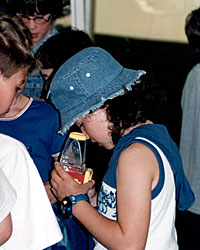The new millennium brings a new sense of urgency toward protecting and preserving our natural resources, especially our drinking water supply.
Increasing demands for clean water coupled with summer drought conditions and pollution problems have sometimes challenged Pennsylvania’s water utility companies in meeting the needs of our residential, business and agricultural communities. It’s time we stop taking clean water for granted!
A new environmental program, known as TAPWater (Talking About Pennsylvania Water), is designed to change the way our youth view their drinking water supply. Now more than ever our youth must look at clean water as the life-sustaining resource it is rather than just assuming it will always be there in an abundant supply.
To help our youth become better water stewards, water utility personnel throughout the state will soon be presenting TAPWater to schools within their distribution areas.
 |
The program was offered by the Pennsylvania Section of the American Water Works Association in conjunction with water utility companies statewide. TAPWater was funded through a grant from the Pennsylvania Department of Environmental Protection. |
“The beauty of TAPWater is that it brings water utility personnel into the classroom,” Mike Snyder, project coordinator with PA AWWA, said. “The men and women who are out there everyday collecting, cleansing and distributing our water have a great deal of knowledge to share about this precious resource. And their appreciation of clean water is contagious.”
 |
Along with classroom visits, the TAPWater program allows water utility companies to assist their schools with educational materials. TAPWater consists of a curriculum supplement featuring text, experiments and fun activities for grades 2-7 plus a supplemental kit box filled with educational videos, interactive CD ROMs, a water-testing kit, posters and other teaching aids. |
The TAPWater manual covers a wide range of water-related topics such as the water cycle, watersheds, wetlands, conservation, pollution, water treatment and distribution. There is also a section on water facts, games and trivia.
“The curriculum supplement is a great educational tool for teachers,” Snyder said. “We worked closely with the (PA) Department of Education to ensure that the materials satisfy all of the new academic standards for environment and ecology and science and technology, which are water-related, for grades 2-7.”
The TAPWater curriculum supplement and educational kit box will be available to schools on a “loan-out” basis from their water utility companies. Those school districts which are not serviced by a participating water utility company can get TAPWater kits by contacting PA AWWA at (717) 774-8870.
“Some of our larger water utility companies are already getting calls from teachers looking for materials to help satisfy the new academic standards,” Snyder said. “TAPWater will fill this need. The timing for the program is perfect.”
Also making TAPWater a timely program is the proposed water resources planning legislation currently under review. “It is important that our youth understand why this concept is being proposed,” Snyder said. “Our future is dependant on water. We must manage it wisely.”
PA AWWA launched its TAPWater pilot program. A select number of water utility companies throughout the state were trained on the TAPWater program and introduced the program to schools within their distribution area. By September 2002, the program was expected to be available throughout the state
Once available statewide, teachers can simply contact a water utility company within their district to obtain information about the TAPWater curriculum supplement and the accompanying kit box of educational materials.
